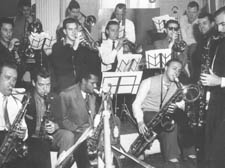|
|
 |
| |

Members of Ronnie Scott’s Big Band in 1955 |
It’s jazz, but if you have to ask...
Alan Plater takes a look at the self-deprecating humour that’s synonymous with jazz and life at Ronnie Scott’s
Ronnie Scott’s Jazz Farrago.
Edited by Jim Godbolt. Hampstead Press
LOUIS Armstrong, asked to define jazz, famously said: “If you have to ask, you wouldn’t understand anyway.”
Musical definitions, in any case, become more meaningless as time passes. Two years ago at the St Magnus Festival in Orkney, I heard some traditional musicians from Kosovo jamming with the locals. The music was a kind of Eastern European/Celtic/ Rock fusion with a touch of Scandinavian thrown in, and it was thrilling. To give it a name would have been to reduce it to a commodity.
Even so, it’s possible to discern a clear historical line in jazz – starting in New Orleans, reaching the western world by way of Chicago and New York – and winding up with a legendary outpost in Frith Street, Soho, under the guidance of Ronnie Scott and his partner Pete King.
Between 1979 and 2006 Jim Godbolt edited the house magazine – a sure-fire way, as he would confirm, of avoiding fame and fortune. His book, Ronnie Scott’s Jazz Farrago, a compilation of interviews, articles, poems and cartoons from those years, gives a very clear idea of what it was like to hang out at Ronnie’s during that period.
Business was variable. Ronnie said the only way to make a million running a jazz club was to start off with two million. Public neglect and penury formed a key part of his stand-up routine: “You should have been here last week. Somebody should have been here last week. We had the bouncers chucking them in. Fellow asked for change of a £10 note and we made him a partner.”
But even when the place was full, as it was increasingly during the 1990s, the problem became that of over-exuberant audiences, and Ronnie’s response was characteristically on the nose, commenting: “Could you make less noise, sir? I remember how excited I was after my first half of lager. But if you insist on
talking during the music, we’ll have to send for Igor with his genital clamp.”
The humour of jazz and its players goes back as far as the music itself. Joe Venuti, the jazz violinist, used to send Wingy Manone, a one-armed trumpet player, a single cufflink for his birthday. A little later, Jack Sheldon, a trumpet player from America’s west coast, was out on the streets during the Los Angeles riots and reprimanded a woman looting from a shop with the words: “Lady, you simply cannot loot those shoes with that handbag.”
Whether these things actually happened, or the words were actually spoken, they all speak to a mythology that we need to sustain our being.
Digby Fairweather tells a story in Jazz Farrago about a musician staying in unsalubrious digs, who walks into the kitchen to find the landlady spreadeagled on the table underneath another of the lodgers. “Oh,” she says to the musician, “you must think I’m a terrible flirt.”
I do occasional gigs with a band led by the great multi-instrumentalist and composer Alan Barnes. I write lyrics, he writes the music and Liz Fletcher sings the songs. On the night I tell the stories behind the songs and on the road with the show, we’ve had many a digs experience. After staying at a B&B in Lancashire our trumpet player, the mighty Bruce Adams, commented: “The towels were so thin you could spit peas through them.” It’s tempting to analyse all this, though the words of my good friend Barry Cryer come to mind: “Analysing humour is like dissecting a frog. Nobody laughs and the frog dies.”
Even so, it’s difficult to avoid the conclusion that jazz humour is different in essence. The tales are sardonic but rarely cruel. The only victims tend to be the musicians themselves, as with the jazz pianist who’s told by his doctor he only has three months to live.
“But on what?” comes the reply.
Alan Barnes told me Zoot Sims’ story only last week. Zoot went into a bar in New York where he found fellow tenor player Al Cohn. There was a baseball game showing silently on the television set.
“What’s the score?” asks Zoot.
“Nine to five,” says Al.
“Who’s winning?”
“Nine.”
That seems to me definitive jazz humour. I could explain why, but if you have to ask…
|
 |
|
 |
| |
|
 |
|


